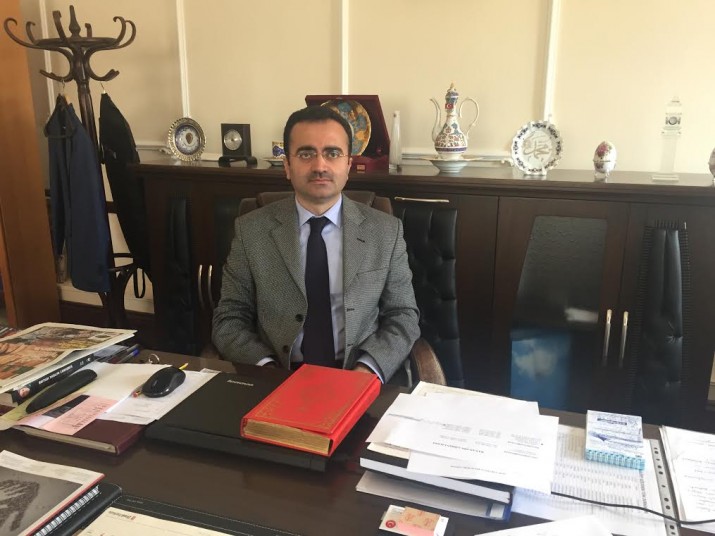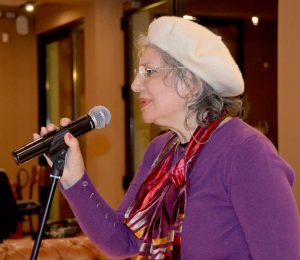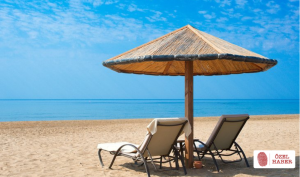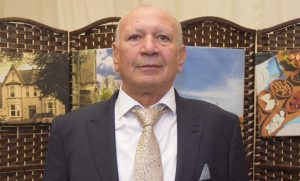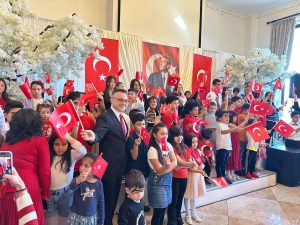A month of grace, abundance and pardon
We asked Mahmut Özdemir, Turkey’s religious affairs attaché for the UK, some burning questions about the month of Ramadan
We asked Mahmut Özdemir, Turkey’s religious affairs attaché for the UK, some burning questions about the month of Ramadan
What is fasting?
One of the duties of our religion is to keep a fast during the month of Ramadan. Fasting involves abstaining from food, water and sexual relations from the moment of morning prayers at sunrise until the sun sets in the evening.
The basic objective of fasting is to raise individuals to a level where they become aware of their responsibilities towards God and his subjects.
This is outlined in the Quran through this phrase: “O you who believe! Fasting is prescribed for you, as it was prescribed for those before you, so that you may guard [against evil].”
What invalidates a fast?
The basic principle of the fast is to keep away from eating, drinking and sexual relations and deprive the nafs of these things. Therefore, these and behaviour that comes to resemble these will invalidate a fast. Eating and drinking encompasses everything that is considered normal to eat. Cigarettes, shisha pipes and other recreational tobacco products, as well as drugs and other addictive substances are all banned during this month.
Any oral medicines – whatever the reason – are similarly restricted, but eye drops, nose drops and pills taken below the tongue do not invalidate a fast.
What about dental treatment? Does that invalidate one’s fast?
The fast of an individual receiving dental treatment, with or without morphine, would not be invalidated as a result of that treatment. But if they swallow blood or any of the substances used during the treatment, that would invalidate it.
And brushing teeth – particularly to block out any mouth odours. What is the position on fasting there?
Brushing teeth does not invalidate one’s fast. Having said that, if any toothpaste or water escapes down the throat, that would invalidate the fast and require an additional day of fasting to make up for it. That is why, considering this risk of annulling your fast, it is best to brush teeth before morning prayers and after the evening iftar meal.
Is it possible to fast by sleeping all day?
For a fast to be valid, it is vital that a person intends to fast and avoids things that could invalidate that fast. Sleeping a little or a lot during daylight hours does not harm the validity of that fast.
Having said that, keeping away from the difficulties that fasting introduces and to sleep for long hours during the daytime in Ramadan does not reconcile with the philosophy and meaning of fasting. Such actions, however, do not invalidate the fast.
How should the iftar table be set?
The iftar table should be laid such so that those people eating are left satisfied. Excesses should be avoided. That is to say, our iftar meals should not become meals of waste.
What would you say regarding zakat and sadaqah offerings?
One of the most attractive aspects of the month of Ramadan is its financial aid and solidarity aspect. One of the tasks that we should not be forgetting is sadaqah, also known as “fitre” in Turkish. Fitre is a type of sadaqah that must be offered the poor at any point during Ramadan before Eid festival prayers at the end of the month.
It may be seen as basic and little but fitre raises the morale of the poor and allows them to experience the joy of the post-Ramadan festival.
It is not a particularly large amount: for a person living in Britain, for example, it is £10 per head. It should not be less than this, but anyone who wishes can give more. It is not much as an amount but it is a contribution that allows the poor to experience the joy of festival with the same happiness as other people.
Ramadan is a month when zakat and sadaqah are both offered. People strive during this month to engage in more goodwill and charitable activities, and help the poor and destitute. A person who spends the whole day fasting will think of their neighbours, relatives, the poor and the less fortunate at these moments.
That is why, in one sense, the month of Ramadan can be seen as a month of philanthropy and good will. If I was to put it another way: Ramadan is the month when the most aid and charity is handed out.
Does Ramadan have a positive effect on family, relatives and social relations?
Of course there is a social perspective to the month of Ramadan. Social relations are where humanity experiences the most problems today, just as was the case yesterday. Love, respect and goodwill are most important in relations between people, particularly in communal life. These values I just mentioned are the main peoples of serenity, trust and peace.
Life is more comfortable and secure in social environments where these values are strong. Where such values are weak, life is uncomfortable, insecure and uneasy.
That is why we need spiritual environments like Ramadan: they help create a more comfortable social environment. The Ramadan atmosphere allows people to rein in their nafs, to mellow, and to behave within the context of ethical values.
For this reason we should use religious days, religious nights and religious festivals to strengthen our bonds with relatives and friends.
What is it like to experience Ramadan away from your home country?
We need to think about this concept of “being away from home”. Of course nothing compares to one’s home country: one misses it if they are apart from it for too long. But the world has become so much smaller today. Transport and communication are not as difficult as once they were.
In addition, our citizens are very good as making a home of the countries in which they live – they are successful at this. They open mosques, foundations and charities. Within ourselves we establish a social liveliness that closely resembles the atmosphere back home.
The month of Ramadan is equally active in this regard. The Quran is read out loud in the mosques, tarawih is read out and iftar evening meals held to break the fast. This level of activity in our mosques effectively takes us back to the Ramadan months we lived back in our home country.
Does one need to be self-sufficient and content during Ramadan?
There are truly many benefits to keeping the fast. One of the positive emotions it provokes among us is the concept of kanaat [the Turkish word for ‘contentedness’]. Worship through fasting strengthens this sense of kanaat, because an individual who is hungry has a better understanding of the deprived and the needy. That person becomes unable to waste.
Our prophet’s description of kanaat as a limitless treasure is important for this reason. Greed leads to destitution, but kanaat leads to grace. The prophet said that he who economises will not struggle to live.
Of course, achieving kanaat does not mean turning one’s back on the world. Muslims must follow this but most also be headstrong when it comes to the property of the world. But Muslims must be both spiritually and physically strong, and not dependent upon anyone.
How to contact
The Turkish Religious Foundation of the United Kingdom, the official representative of Turkish religious authorities in Britain, can be contacted at its headquarters in North London.
Address: 31 High Street, Hornsey, London N8 7QB
Telephone: 020 8340 55 00
Fax: 020 8881 01 52
Email: info@diyanet.org.uk
Web: www.diyanet.org.uk

